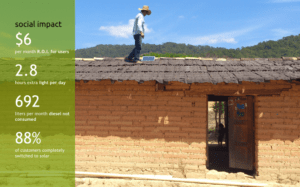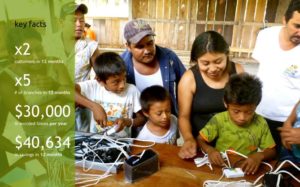
Search
Lack of access to electricity has knock-on effects to massive social issues related to poverty, health and education. Children need light to do homework. Smoke from traditional energy sources has negative respiratory effects. What’s more, it is rich and urban populations that disproportionately receive regular electricity.
In Mexico, more than 3 million people go without electricity in their homes. Less than 5% of electricity produced nationally comes from renewable energy. Combining these two issues led to Iluméxico developing a solar solution to replace diesel generators or costly expansions of the existing infrastructure. Iluméxico’s mission is to provide access to solar systems in scarce resource communities by providing the equipment, local training, and microfinancing programs.
As with all social enterprises, having the idea is simply the first step. The next was to test if it worked. After that it gets really difficult: how can they reach all 3 million people who need electricity?
Since January 2014, Iluméxico has begun to make ground on this ambitious target, growing from a single branch in Mexico City to five branches in four states, with 14 more branches in the pipeline. They have doubled their customer base, and are on schedule to double it again in the coming year.
“Our goal is to have no house without electricity in Mexico by 2024.”
Manuel Wiechers, Co-founder and CEO, Iluméxico

Their secret? Using technology to combat inefficiencies in their model.
Before January 2014, the business process for Iluméxico was convoluted and plagued with delays. Iluméxico was operating a country-wide operation out of a single branch in Mexico City, which meant field staff were spending two to three week stretches in the field registering new clients, logging sales and tracking repayments – all with paper. As Iluméxico planned to expand the number of field officers, customers, and physical branches, they realized this solution was not scalable.
Carlos Pierre, Senior Manager of Strategic Initiatives at Kiva, described this early model. “Essentially, they were selling solar home systems to people in unelectrified pockets in Mexico. Iluméxico had already financed a few systems and had some rudimentary disbursement and repayment collection practices.” He also notes that Iluméxico were unable to give information about “exact repayment rate breakdown and its correlation to equipment failure.”
Iluméxico’s multi-phase methodology for their energy access and community development programs meant that each trip postponed their impact. The first phase is Community Evaluation, where field staff check government electrification lists to identify communities with the highest percentage of households disconnected from the electrical grid. Field staff would travel to the communities for one week to confirm the government data. Field staff would then make another trip to the communities with the highest potential for impact, to promote their work and products all while collecting customer sales order data.
After this, they would return to their headquarters in Mexico City to input the data and begin to manufacture the necessary equipment. From the time the field staff collected the initial information, it took 30 days to collate and analyse this data and produce reports. Finally, they would make a third trip to their chosen area to perform installations – typically between 100-150 per municipality.
They needed to streamline this process.
As Manuel Andrade, Iluméxico’s Head of Operations, explained, “we were looking for a way to analyse data in an orderly fashion and be able to collect the numbers from a mobile device rather than separate Excel spreadsheets or hand-written pages.” They also needed to be able to remotely manage operations so they could cut out all those time consuming trips to and from target areas.
Introducing TaroWorks shifted the goalposts of the organization.
Iluméxico have gone beyond using TaroWorks to collect sales data to also manage other field operations including tracking maintenance, monthly repayments, and field staff expenses. They went from having three staff members each spending seven hours a week collating and manipulating data to less than five hours in total – a massive reduction in man power spent on non customer-facing activities. This has given them the time to examine operations via their dashboards more closely.
“We have been able to process more information in less time and start monitoring consumer patterns and access this information from the field.”
Manuel Andrade, Head of Operations, Iluméxico
They have been able to identify and respond to trends in customer behavior in different branches to allow for regional variation in poverty levels, product desire and assorted social factors. The executive management team built their own dashboards from scratch, summarizing metrics ranging from performance for different categories of sales, to their repayment statuses, a topic that Iluméxico presented on in a webinar last year.
Their ability to take a high-level look at their operations at least once a week has allowed them to identify new activities to improve their model: tracking maintenance of equipment, integrating cashflow information into a single dashboard, analysing training in terms of performance. ‘Visibility’ is now a key term for the Iluméxico management team.

They are also able to track performance remotely which is part of how they have been able to expand to so many new branches. They plan to introduce performance-related pay to their field staff, instantly accessible and visible through the mobile devices that they use to complete and report on tasks. They have also increased the number of employed field staff to 14, staying connected through centrally designed surveys and jobs that they track through Salesforce.com.
Iluméxico have also been able to calculate risk in their portfolio of customers. Manuel Wiechers estimates that, before adopting TaroWorks, 65% of installations were deemed to be at risk. They are now able to monitor their actual portfolio-at-risk in real-time, and that number has now been lowered to 50%, totalling an estimated $30,000 in avoided potential loss.
“[Iluméxico] now have info and ratios about their delinquency rate, they now know where their weaknesses and strengths are. Now they have info they can use to take the best decisions for their business.”
Juan Barbed, Portfolio Manager, Kiva
They are always seeking to reduce this risk level, aiming for an eventual figure between 30 and 40%. Before TaroWorks, this process was impossible but now they have a figure to manage against.
The ability for Iluméxico to scale their impact to more customers is precisely the outcome that TaroWorks is built to achieve. Seeing a small, innovative, socially driven enterprise utilize the robust range of features exactly fits TaroWorks’ vision of making it as easy to manage across the last mile as it is across the first mile.
Adopting mobile technology into the Iluméxico model has opened up more options. They are now able to access more diverse sources of funding – investors looking for technological solutions to poverty-related issues or grants for innovative use of mobiles. They have recently adopted a data sharing policy with local NGOs which will earn them additional monthly fee revenues for population information
Iluméxico’s total savings from streamlining their business with TaroWorks works out at $40,634 in the last 12 months. These are vital savings for a small business, particularly as they took on the additional risks of quintupling their branches.
The next year will be another set of risks, just as with any rapidly expanding organization. Iluméxico will be facing that knowing that they have eliminated many inefficiencies, accessing more customers than ever while improving their service. If they are to meet their ambitious target of eliminating the lack of access to electricity in Mexico by 2024, integrating data analysis will be critical that success.
“We think that mobile technology will be a core instrument for scaling up the business and will help us have an accurate, real-time and broad outlook of our operations in Mexico and abroad.”
Manuel Andrade
Many TaroWorks customers previously used paper and spreadsheets to collect data, analyze metrics and run field operations. Let us show you how TaroWorks’ offline mobile field service app can help scale your business by digitizing sales and supply chain management, increasing agent network productivity and analyzing data in real-time for business insights.
POST TOPICS
NEXT POST
Sign up to receive emails with TaroWorks news, industry trends and best practices.
TaroWorks, a Grameen Foundation company.
Site by V+V